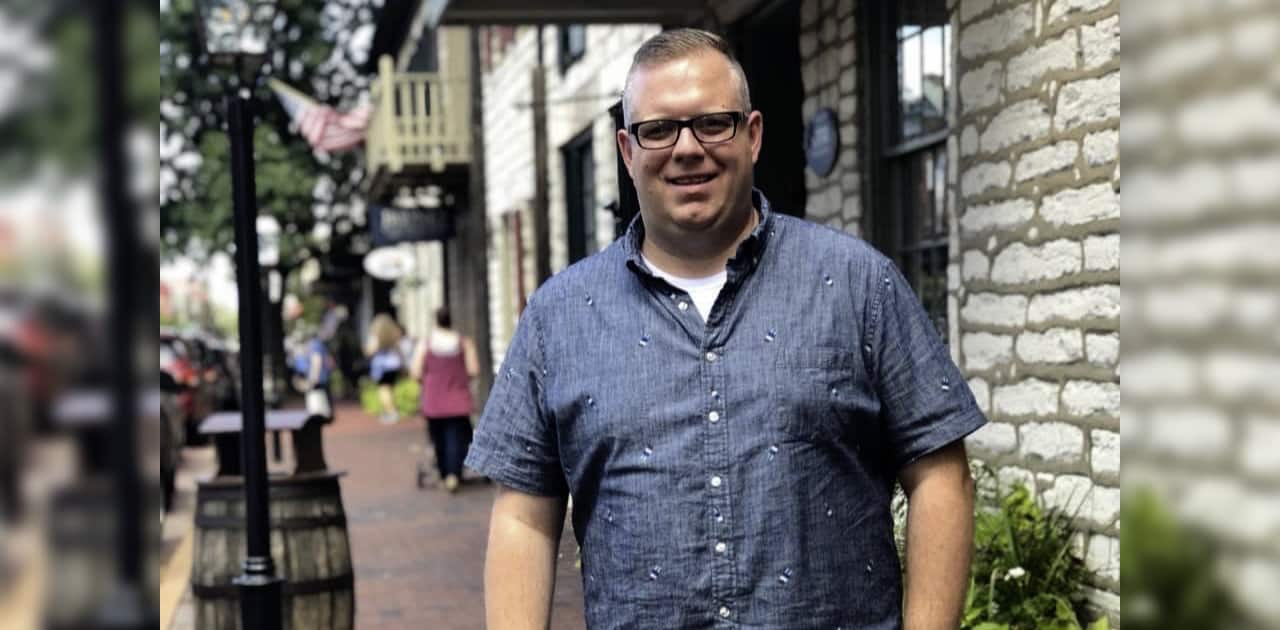When police, fire, or medical health professionals train for their jobs they start in the classroom by watching videos of various scenarios and listening to discussions. But it’s not long before students are working with manikins and live volunteers. Forensic interviewers begin their training by observing, watching, dissecting, and questioning recorded forensic interviews. But have no ability to train with manikins. Instead, they start by interviewing live, adult volunteers.
“I felt good about my interview,” recalls Cameron Pence about his first time with an adult training volunteer.
Since September 2021, Pence has been the Child Advocacy Center Coordinator for Meridian Health Services (MHS). Meridian operates a CAC out of their Muncie, Indiana-based facility. “My background with kids is as a youth pastor for eleven years, then social work,” recalls Pence. “It was all a much less rigid experience talking with kids.”
Pence, who has lived nearly his entire life in and around Muncie and Delaware County, has worked at MHS for two years, first as a Behavioral Clinician helping children at home and in schools develop coping skills. Those coping skills include helping kids who are violent, defiant, or need help with decision-making, mindfulness, anger management, working through ADHD, or practicing empathy, focus, and attention. “A lot of that goes with PTSD and trauma,” says Pence.
In his first forensic interviewing training, Pence walked up before a group of other adults to mock-interview another adult playing the role of a child. You can imagine how anxiety-inducing that might be for most people. According to one small study, mock forensic interviews are valuable despite the anxiety it causes among participants.
“I want to build rapport,” Pence says, but immediately after the interview, “The first thing [the trainer] said was: ‘You’re too nice. You use too many ‘buddies’, ‘mans’, and other friendly euphemisms. You’ve clearly worked with kids before and this is a different thing.’”
For Pence, it was among his first forays into a series of interview trainings countless others have participated in nationwide and the recognition he’d need to un-learn all the things he had used in the past talking with children. “She told me to be kind, understanding, but you don’t want to be super friendly because a defense attorney is going to pick it all apart.”
This training experience would stick with Pence going into his first real interview at MHS in late 2021. “I was saying to myself, ‘Don’t say dude’,” he says. The interview was an improvement, he adds, but he took criticism from his multidisciplinary teammates afterward with refreshing honesty. “I told them to let me know how I did,” says Pence, “I can take it.”. He got a disclosure from his first child and deeply understood the kind of work CACs do: “This is just something different than helping relate to kids through coping skills.”
Meridian Health offers medical and mental health practices and is among a handful of medical providers also operating a CAC. Pence interviewed for the CAC Coordinator position, a management-level role, without knowing it was for the CAC. “I knew about the CAC, but when [management] started explaining more about the process, MDT, and the CAC I got pretty excited. I knew I didn’t want to do something purely administrative, and this would let me work with families and still get to interact with kids,” he says.
Because MHS offers a co-located CAC within its facility, families and children are mere steps away from counselors, physicians, therapists, and other healthcare professionals after the interview. “We offer everyone who comes to the CAC the option to request therapy,” says Pence, explaining after their initial assessment, he estimates about half move forward with the process.
“We’ve done a good job of making the experience as comfortable and smooth as possible for families,” says Pence, adding, “and most all of the time this is a smooth connection between agencies like law enforcement, child services, and our mental health teams.”
In the last six months, Pence has continued sharpening his skills and working with other interviewers and MDT members. He’s also seeing trends he’s observed across his career come into sharper focus. “It seems like we get an increasing number of child exploitation cases that revolve around social media, especially with apps like Snapchat that delete everything,” says Pence. “It’s hard to track people down and there’s a lot of child grooming in apps like that.” Like most CACs in Indiana, the majority of cases—about 80%—coming to MHS’ CAC are sexual abuse related, and most involve family members.
“Everyone’s helped me understand things I didn’t know,” says Pence. “Jan [Lutz] at the Chapter continues to mentor me on many things, and the Victim Advocates, law enforcement officers, and other team members here work well and make things as easy as possible for everyone else,” says Pence, who continues to learn and sharpen his forensic interviewing skills. “I was telling a [Victim Advocate] the other day, “I’m terrified to do it but it probably means I need to do it.” Because as interviewers know, as terrifying as it may be to interview a child in crisis, just imagine how terrified the child is—and how much they’re relying on people like Cameron Pence.

